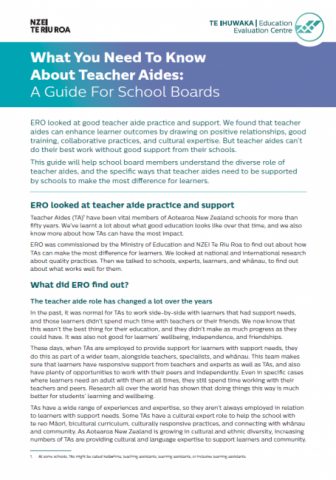Summary
ERO looked at good teacher aide practice and support. We found that teacher aides can enhance learner outcomes by drawing on positive relationships, good training, collaborative practices, and cultural expertise. But teacher aides can’t do their best work without good support from their schools.
This guide will help school board members understand the diverse role of teacher aides, and the specific ways that teacher aides need to be supported by schools to make the most difference for learners.
Whole article:
What you need to know about teacher aides: A guide for school boardsERO looked at teacher aide practice and support
Teacher Aides (TAs) have been vital members of Aotearoa New Zealand schools for more than fifty years. We’ve learnt a lot about what good education looks like over that time, and we also know more about how TAs can have the most impact.
ERO was commissioned by the Ministry of Education and NZEI Te Riu Roa to find out about how TAs can make the most difference for learners. We looked at national and international research about quality practices. Then we talked to schools, experts, learners, and whānau, to find out about what works well for them.
What did ERO find out?
The teacher aide role has changed a lot over the years
In the past, it was normal for TAs to work side-by-side with learners that had support needs, and those learners didn’t spend much time with teachers or their friends. We now know that this wasn’t the best thing for their education, and they didn’t make as much progress as they could have. It was also not good for learners’ wellbeing, independence, and friendships.
These days, when TAs are employed to provide support for learners with support needs, they do this as part of a wider team, alongside teachers, specialists, and whānau. This team makes sure that learners have responsive support from teachers and experts as well as TAs, and also have plenty of opportunities to work with their peers and independently. Even in specific cases where learners need an adult with them at all times, they still spend time working with their teachers and peers. Research all over the world has shown that doing things this way is much better for students’ learning and wellbeing.
TAs have a wide range of experiences and expertise, so they aren’t always employed in relation to learners with support needs. Some TAs have a cultural expert role to help the school with te reo Māori, bicultural curriculum, culturally responsive practices, and connecting with whānau and community. As Aotearoa New Zealand is growing in cultural and ethnic diversity, increasing numbers of TAs are providing cultural and language expertise to support learners and community.
How can schools support teacher aides to have the most impact?
Good quality TA practice requires good quality support from leaders and teachers. This involves setting clear expectations, creating good communication systems, prioritising planning and discussion time for TAs, careful timetabling, and robust professional support school-wide.
What could you ask your school, about support for teacher aides?
- If TAs work with learners with support needs, do they have robust training and professional support? How is the school assured that TAs are equipped to respond to the specific needs of those learners, to support their ability to connect with teachers and peers, and to promote their independence?
- Does the school know how to access PLD funding for TAs?
- Are classroom teachers confident to meet the needs of learners with support needs alongside TAs? Do they need more information and training?
- If TAs are responsible for delivering structured interventions or programmes, how is the school sure that interventions are being delivered as intended, and that they are making a difference to learning outcomes?
- TAs with cultural support roles too often have extra work and stress. How is the school monitoring the workload and wellbeing of TAs, including Māori TAs, who have a cultural and/or language support role?
- Meetings with teachers, even very brief ones, make a big difference to the quality of TA practice. These should happen within TAs’ normal work hours – not during break times. Do all TAs have times to connect with teachers about lessons, expectations, timetables, interventions, or programmes, and to share their insights about learners?
If you’d like to know more, you can look at these links:
Working together: How teacher aides can have the most impact is ERO’s full report about what good TA practice and support looks like.
The summary of this report is here.
Thriving at school? Education for disabled learners in schools is ERO’s evaluation on provision for disabled learners in schools.
The summary of our evaluation on education provision for disabled learners is here.
The TA pay equity work matrix sets out the range of valued practices of TAs.
